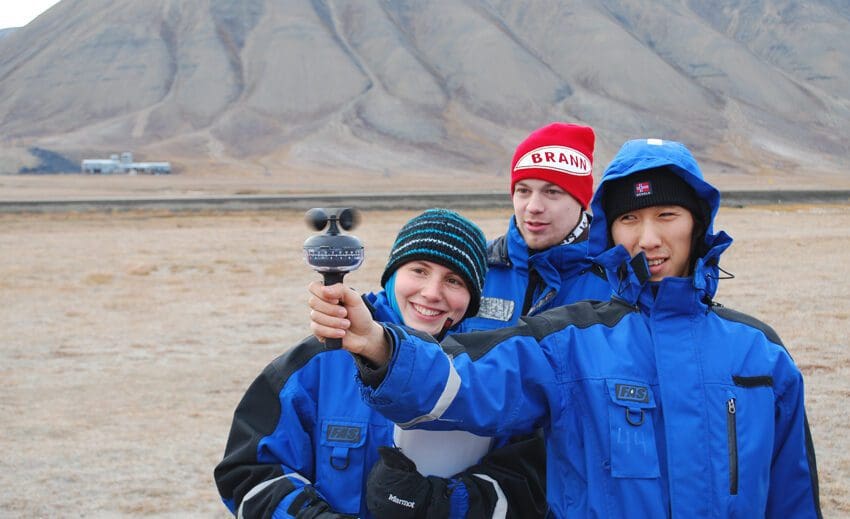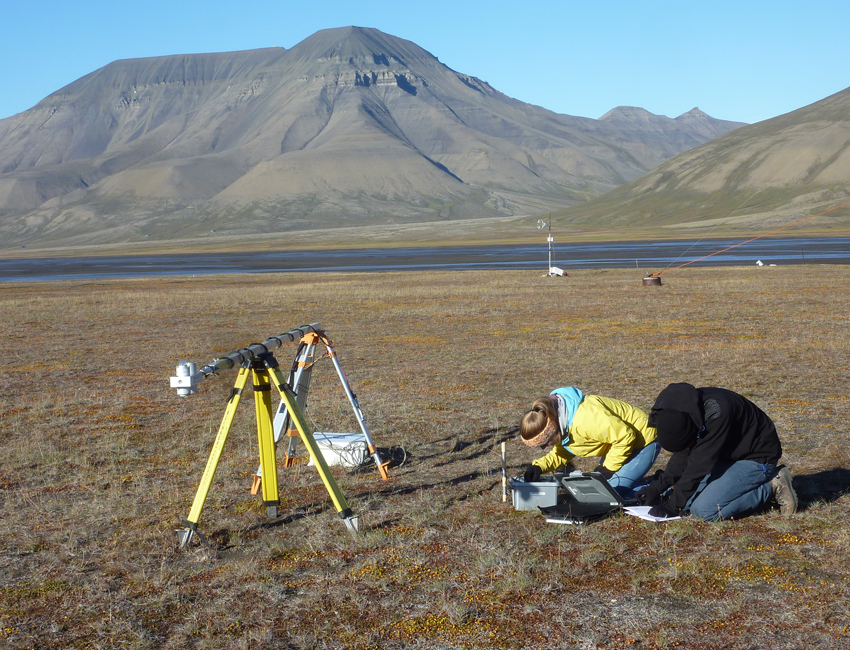AGF-213 Polar Meteorology and Climate (15 ECTS)
ID:
AGF-213
CREDITS:
15 ECTS
APPLICATION DEADLINE:
April 15, 2024
START DATE:
August 05, 2024
END DATE:
December 13, 2024

AGF-213 students on fieldwork in Adventdalen. Photo: Tor de Lange/UNIS.
| Grade: | Letter grade (A through F) |
| Course Cost: | Fieldwork, NOK 1200 (5 days x NOK 200 per overnight stay) |
| Course Capacity Min/Max: | 9/18 students |
| Language of instruction: | English |
| Examination support material: | Bilingual dictionary between English and mother tongue |
Course requirements
60 ECTS in mathematics and physics or a related discipline. The applicant must be enrolled in a programme at Bachelor level, or document that the courses are approved into the applicant’s current study programme. It is also recommended that the applicant has a minimum basic knowledge of meteorology equivalent to “Essentials of Meteorology, An Invitation to the Atmosphere” by C. Donald Ahrens & Robert Henson (2017).
The course should be combined with AGF-214 Polar Ocean Climate and the courses are designed to complement each other.
Academic content
The course offers an introduction and overview of weather and climate processes that are typical for polar regions, with examples focusing on local conditions in the European Arctic and around Svalbard.
The topics covered include boundary layer meteorology; dynamic meteorology; radiation ; numerical modelling and weather forecasting; climate processes and climate change. Emphasis will be on the differences between the polar atmosphere and the atmosphere at mid-latitudes and on understanding the physical processes involved. The topics will be discussed in relation to climate history, current physical conditions, and future climate change.
The field component of the course provides an introduction to a number of meteorological observational techniques. Special attention will be paid to exchange processes between the atmosphere and diverse surfaces, local meteorological processes typical of polar regions and the challenges of weather forecasting in the Arctic.
Learning outcomes
Upon completing the course, the students will:
Knowledge
- master terminology and theory used in polar meteorology and climate
- describe important meteorological and climatic processes in the polar regions and how these processes influence local weather and climate in Svalbard
- describe challenges in observing and modelling these processes
- recognise the role of polar climate processes in shaping the global climate.
Skills
- demonstrate practical skills in handling scientific meteorological instruments such as automatic weather stations, weather balloons and radiometers
- process and analyse meteorological data collected during fieldwork using software such as MATLAB or Python
- plan and execute small, meteorological fieldwork projects in a high Arctic environment
- apply knowledge on polar meteorology and climate in interpreting atmospheric phenomena occurring at high latitudes.
General competences
- efficiently administer workload and share information within a group
- communicate their own scientific results, interpretations and conclusions, both orally and in writing
- self-assess their own field skills using a range of reflective and evaluative techniques
- peer-review scientific reports
- critically read, evaluate, and debate scientific literature.
Learning activities
The course extends over a full semester. Initially, students attend four days of compulsory Arctic survival and safety training.
The course centres on various learning activities which all serve to give a good understanding of meteorology and climate processes at high latitudes. Besides lectures, we also utilise learning activities such as student-driven seminars, group work, and literature discussions to achieve deeper content knowledge, and provide students with competence to read, evaluate, and debate scientific literature.
Other central learning activities include a ten-day long fieldwork at Petuniabukta (5 days) and in Longyearbyen (5 days) and associated research projects. These learning activities provide the students with first-hand experience of the Arctic environment on land in addition to field-based research methodology, and the process of collecting, analysing, evaluating, and communicating scientific results. As part of the fieldwork preparations, the students will get and provide each other with an overview of the meteorological instruments to be used, how they work, how they are operated, and the quality and nature of the corresponding data. During the fieldwork, the students will practice various measurement techniques and get hands-on experience with operating meteorological instruments when collecting data for their own and their fellow students’ research projects. The research projects are carried out in groups. After the fieldwork, in parallel with other learning activities, the students analyse and interpret the collected data as part of the research projects under guidance by the course instructors. In addition, the students will provide compulsory fellow student reviews on assignments, and finally deliver a written report, which also will be presented orally.
The final assessment will test the students in their understanding of the theory and how they have implemented it in their reports.
Summary
- Total lecture hours: 65 hours.
- Total seminar hours: 20 hours.
- Fieldwork: 5 days.
Compulsory learning activities
All compulsory learning activities must be approved in order to sit the exam.
- Fieldwork with accompanying workshops
- Fellow student reviews of field reports
- Oral presentation of reports
Assessment
- All assessments must be passed in order to pass the course.
- Each assessment is graded, and subsequently combined into a single grade. Partial grades for each assessment will be available.
| Method |
Percentage of final grade
|
| Written fieldwork report | 20% |
| Oral exam | 80% |
Student life

